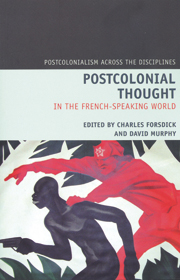Book contents
- Frontmatter
- Contents
- Acknowledgements
- Introduction: Situating Francophone Postcolonial Thought
- Section 1 Twelve Key Thinkers
- 1 Aimé Césaire and Francophone Postcolonial Thought
- 2 Maryse Condé: Post-Postcolonial?
- 3 Jacques Derrida: Colonialism, Philosophy and Autobiography
- 4 Assia Djebar: ‘Fiction as a way of “thinking”’
- 5 Frantz Fanon: Colonialism and Violence
- 6 Édouard Glissant: Dealing in Globality
- 7 Tangled History and Photographic (In)Visibility: Ho Chi Minh on the Edge of French Political Culture
- 8 Translating Plurality: Abdelkébir Khatibi and Postcolonial Writing in French from the Maghreb
- 9 Albert Memmi: The Conflict of Legacies
- 10 V. Y. Mudimbe's ‘Long Nineteenth Century’
- 11 Roads to Freedom: Jean-Paul Sartre and Anti-colonialism
- 12 Léopold Sédar Senghor: Race, Language, Empire
- Section 2 Themes, Approaches, Theories
- Notes on Contributors
- Bibliography
- Index
11 - Roads to Freedom: Jean-Paul Sartre and Anti-colonialism
from Section 1 - Twelve Key Thinkers
- Frontmatter
- Contents
- Acknowledgements
- Introduction: Situating Francophone Postcolonial Thought
- Section 1 Twelve Key Thinkers
- 1 Aimé Césaire and Francophone Postcolonial Thought
- 2 Maryse Condé: Post-Postcolonial?
- 3 Jacques Derrida: Colonialism, Philosophy and Autobiography
- 4 Assia Djebar: ‘Fiction as a way of “thinking”’
- 5 Frantz Fanon: Colonialism and Violence
- 6 Édouard Glissant: Dealing in Globality
- 7 Tangled History and Photographic (In)Visibility: Ho Chi Minh on the Edge of French Political Culture
- 8 Translating Plurality: Abdelkébir Khatibi and Postcolonial Writing in French from the Maghreb
- 9 Albert Memmi: The Conflict of Legacies
- 10 V. Y. Mudimbe's ‘Long Nineteenth Century’
- 11 Roads to Freedom: Jean-Paul Sartre and Anti-colonialism
- 12 Léopold Sédar Senghor: Race, Language, Empire
- Section 2 Themes, Approaches, Theories
- Notes on Contributors
- Bibliography
- Index
Summary
There is, perhaps, an excessive obviousness in the decision to focus on the concept of freedom in any discussion of Jean-Paul Sartre, since if there is one pre-eminently Sartrean theme, it is arguably that of freedom. However, precisely because of the dangers inherent in the ‘obviousness’, in regarding the chosen subject as already known and comprehended, but also because of the inevitably changing and evolving sense of the term in the context of a lifetime's passionate engagement, we would be wrong to think that we fully understand Sartre's repeated working through – ‘elaboration’ in the strongest Gramscian sense – of the meanings of freedom. As he once commented: ‘La liberté est une, mais elle se manifeste diversement selon les circonstances’ [Freedom is indivisible, but it manifests itself differently according to the circumstances] (Sartre, 1947: 289).
The second ‘obviousness’ – the evocation of Sartre's great post-war trilogy Les Chemins de la liberté in the title of this chapter – is also deliberate, since if Sartre was keenly aware of the historical and conjunctural mutability of the character of freedom, he was no less aware of the diverse nature of the paths to its achievement. That was as true for himself as an individual as it was for the kind of collectivities that we shall be examining in the course of this chapter, and in Sartre's case we can identify, and somewhat schematically separate, three main paths. The first of these, the last to be taken fully and the one to which we will devote least attention, is the practical-activist path.
- Type
- Chapter
- Information
- Postcolonial Thought in the French Speaking World , pp. 147 - 156Publisher: Liverpool University PressPrint publication year: 2009



